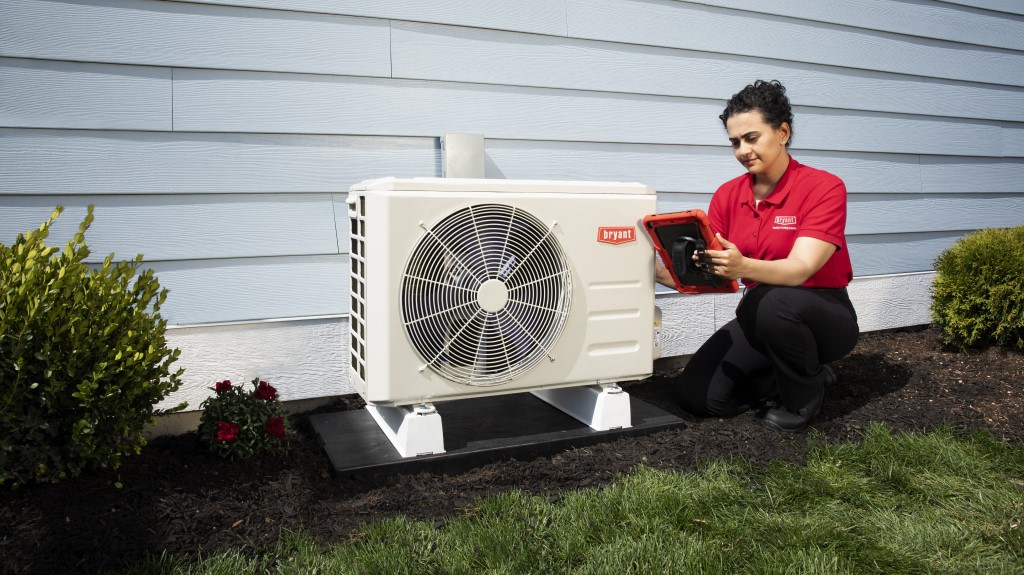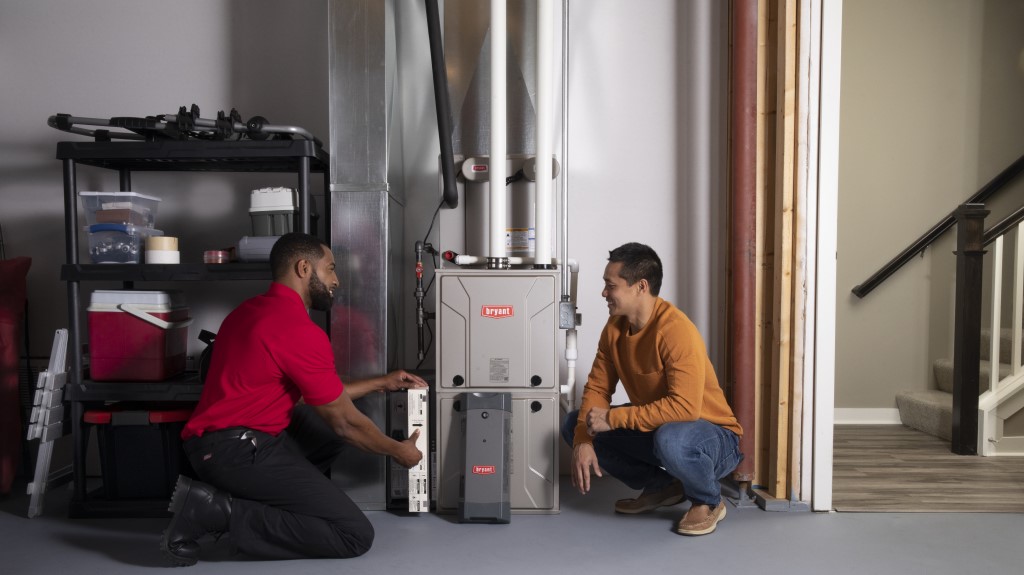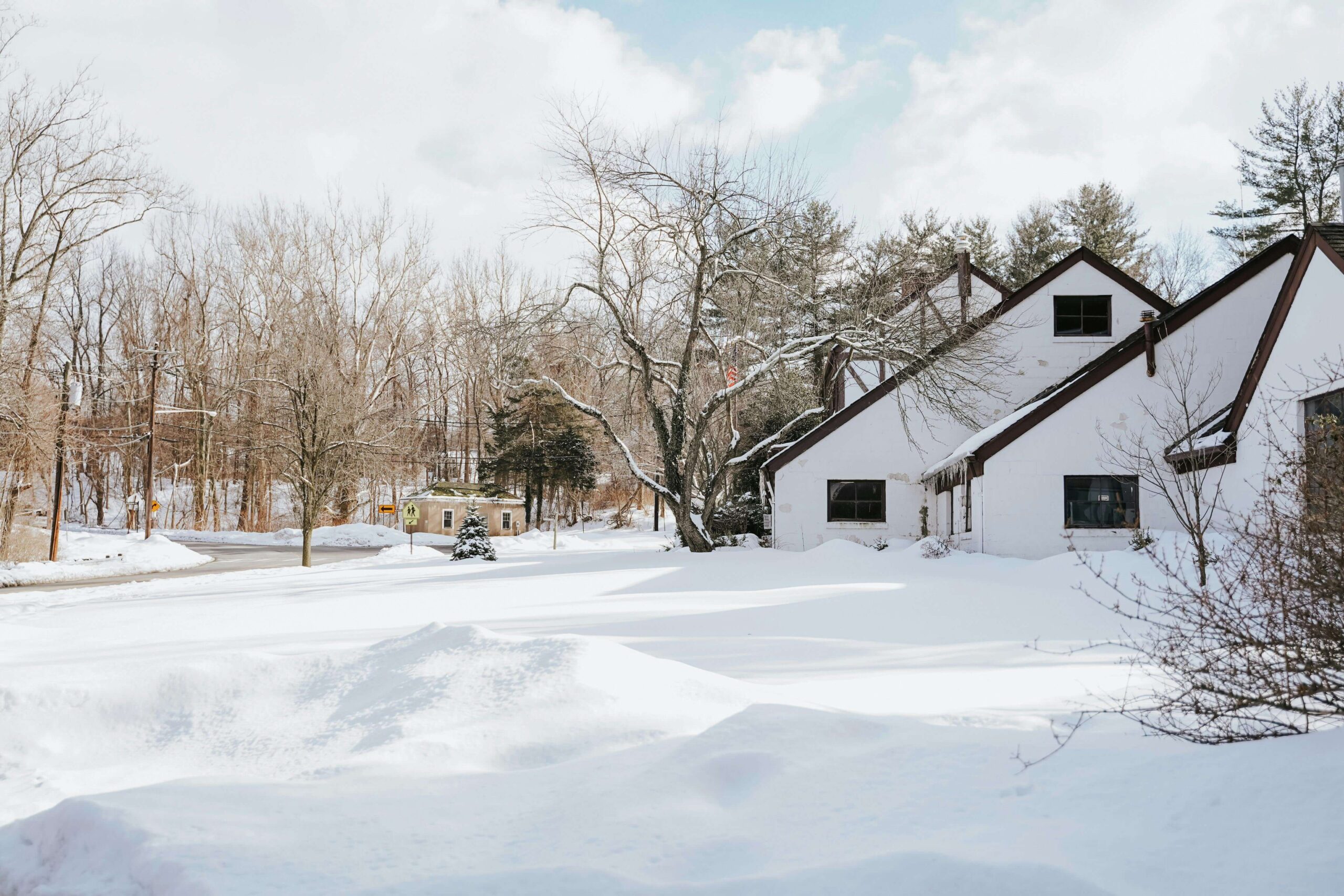The main difference between heat pumps and furnaces lies in their functionality and energy sources. In this blog, Ideal Heating & Air Conditioning will explain these differences in further detail and offer some advice.
1. Heat Pump vs Furnace: The Main Differences
2. Is a Heat Pump Better Than a Furnace?
3. What Is the Down Side to a Heat Pump?
4. Should I Switch From a Furnace to a Heat Pump?
5. What To Look For When Buying a Heat Pump
Heat pumps transfer heat and can both heat and cool efficiently, making them ideal for milder climates, while furnaces generate heat by burning fuel or using electricity, working well in colder climates but only providing heating. Heat pumps are generally more energy-efficient and eco-friendly, but furnaces may have lower upfront costs. Click on the links above to learn more or continue reading. If you have other questions or wish to speak with a certified HVAC specialist, contact us at Ideal!
Heat Pump vs Furnace: The Comparisons


Heat pump vs Furnace: Which one is the winning choice?
1. Heat Pump vs Furnace: The Main Differences
As we said earlier, the main difference between heat pumps and furnaces lies in their functionality and energy sources. Let’s explore this further.
How They Generate Heat
Heat pumps move heat from one place to another, rather than generating it. In heating mode, they extract heat from outside air (or the ground in geothermal systems) and transfer it indoors. In cooling mode, they work like an air conditioner, removing heat from the inside and releasing it outside. They operate using electricity.
On the other hand, furnaces generate heat by burning fuel (natural gas, propane, oil) or using electricity (electric furnaces). The heat produced warms air, which is then distributed through ducts.
Dual-Functionality
Heat pumps can heat and cool, offering year-round climate control in a single system. However, furnaces only provide heating, so you’ll need a separate air conditioning system for cooling.
Conclusion
If you’re deciding between the two, the main factor to consider is your climate and energy preferences. For milder climates, heat pumps often make sense. In colder regions, a furnace or a dual system (furnace + heat pump) might be better. We’ll consider other pros and cons below.
Watch the video above for a synopsis of the differences between a heat pump vs furnace.
2. Is a Heat Pump Better Than a Furnace?
Heat Pump Pros & Cons
Below we’ll outline the pros and cons of having a heat pump followed by the pros and cons of choosing a furnace.
Advantages:
- Energy Efficiency: Transfers heat rather than generating it, making it more energy-efficient, especially in milder climates.
- Dual Functionality: Provides both heating and cooling in one system, reducing the need for a separate air conditioner.
- Eco-Friendly: Produces fewer carbon emissions, especially when powered by renewable electricity.
- Lower Operating Costs: Can be cheaper to operate in areas with mild winters and low electricity costs.
Disadvantages:
- Performance in Cold Climates: Standard models are less effective in extreme cold, though cold-climate models are available.
- Higher Upfront Cost: Installation costs are often higher than furnaces.
- Lifespan: Typically lasts 10–15 years, shorter than a furnace.
Furnace Pros & Cons
Advantages:
- Reliable Heating: Performs well in extreme cold, providing consistent and powerful heat.
- Longer Lifespan: Usually lasts 15–20 years, making it a durable option.
- Lower Initial Cost: Typically cheaper to install than a heat pump.
- Independence from Electricity: Gas furnaces don’t rely on electricity, which is beneficial during power outages.
Disadvantages:
- Higher Operating Costs: Burning fuel (natural gas, propane, oil) can be more expensive in the long term.
- Environmental Impact: Produces more greenhouse gases, especially if using fossil fuels.
- Heating Only: Requires a separate air conditioning system for cooling.
Conclusion
If you live in a milder climate, a heat pump is better because it efficiently heats and cools year-round. A heat pump is also a greener option with potentially lower long-term costs if you are eco-conscious or are concerned about lowering your utility bills. If you live in a colder climate, a furnace or a hybrid system (furnace + heat pump) may be more effective for consistent warmth. Plus, if you are budget-conscious, a furnace has a lower installation cost and a longer lifespan. Ultimately, the choice of heat pump vs furnace depends on your climate, energy costs, environmental priorities, and budget.

This chart summarizes the features and differences of a heat pump vs furnace.
3. What Is the Down Side to a Heat Pump?
While heat pumps are highly efficient and versatile, there are some downsides to consider, depending on your needs and location. These possible disadvantages include the following:
Reduced Efficiency in Extremely Cold Climates
Heat pumps rely on extracting heat from the outside air, and their efficiency drops in colder temperatures (typically below 25°F or -4°C). In very cold regions, the system may need to work harder or switch to auxiliary heating (like electric resistance heating) to maintain comfort, which can increase energy costs.
Higher Initial Cost
The upfront installation cost of a heat pump can be higher than that of a traditional furnace, especially if it involves installing a ducted system or a ground-source (geothermal) heat pump. While heat pumps are generally more efficient in the long run, the higher initial investment may be a barrier for some homeowners.
Requires Regular Maintenance
Heat pumps need regular maintenance to ensure they continue running efficiently, including cleaning filters, checking refrigerant levels, and servicing the outdoor unit. If neglected, performance can drop, and the system may wear out more quickly.
Limited Heating Capacity in Extreme Cold
In areas with extreme winter temperatures, a heat pump alone might not provide sufficient heat, requiring a supplemental heating system (like a gas furnace or space heaters). In such cases, a hybrid heating system (heat pump + furnace) may be necessary, which can add to installation and operating costs.
Noise
The outdoor unit of a heat pump can be noisy, especially during defrost cycles in the winter or when operating at full capacity. This could be disruptive in quiet neighborhoods or if the unit is placed near living spaces.
Potential for Shorter Lifespan in Harsh Environments
Heat pumps exposed to extreme weather conditions (like heavy snow, ice, or salty coastal air) may wear out faster, especially the outdoor unit. The lifespan of the unit can decrease if it’s not properly maintained or protected.
Efficiency Drops with Higher Heating Demand
As outdoor temperatures drop, heat pumps can lose efficiency because they must work harder to extract heat. If you live in an area with fluctuating temperatures or long, harsh winters, the increased demand for heating might offset the efficiency gains.
Conclusion
While heat pumps are a great option for most climates due to their energy efficiency and dual heating/cooling functionality, they may not be the best choice in extremely cold climates unless you invest in a cold-climate heat pump or a hybrid system. Additionally, the higher initial cost and the need for regular maintenance are factors to weigh when considering whether a heat pump is right for your home.

Climate is usually the number one factor when debating between a heat pump vs. furnace.
4. Should I Switch From a Furnace to a Heat Pump?
Switching from a furnace to a heat pump can be a great decision depending on your specific needs, location, and budget. Here are some factors to consider to help you determine if it’s the right move for you:
Climate Considerations
If you live in a region with mild winters (above 25°F or -4°C) and don’t experience extreme cold, a heat pump can be an excellent choice. It can efficiently heat and cool your home with lower energy consumption than a furnace. However, in areas where temperatures regularly dip below freezing, a heat pump may not be as efficient. While cold-climate heat pumps are available, you may need a hybrid system (heat pump + furnace) for backup heating during extremely cold spells.
Energy Efficiency & Operating Costs
Heat pumps are much more energy-efficient than traditional furnaces, especially in mild climates. They move heat instead of generating it, so they use less energy, resulting in lower heating and cooling bills. If you have a natural gas furnace, switching to an electric heat pump could lower your carbon footprint and energy consumption, especially if your electricity comes from renewable sources.
Environmental Impact
Heat pumps are a greener option, as they have lower emissions compared to fossil fuel-powered furnaces. If you’re looking to reduce your home’s carbon footprint, a heat pump is a good choice, especially if you pair it with renewable energy.
Comfort & Versatility
Heat pumps provide both heating and cooling in one unit, which can save space and simplify your HVAC setup. If your home doesn’t have central air conditioning, a heat pump could be a more cost-effective alternative to installing a separate AC system. Generally, heat pumps maintain more consistent humidity levels compared to furnaces, which can lead to better overall comfort.
Initial Installation Cost
The initial cost of installing a heat pump (especially if you’re upgrading from a furnace) can be higher than a traditional furnace. This includes the cost of the unit, installation, and potentially ductwork modifications. Plus, many regions offer incentives, rebates, or tax credits for switching to energy-efficient systems like heat pumps, which could help offset the higher upfront cost.
Longevity & Maintenance
As per maintenance, heat pumps generally require more regular maintenance (filter changes, defrosting, etc.) compared to furnaces. However, with proper maintenance, they can last 10-15 years or more. Furnaces typically have a longer lifespan (15-20 years), while heat pumps may need to be replaced sooner, particularly in harsh climates.
Noise Considerations
Concerned about noise? Heat pumps can be noisier than furnaces, especially outdoor units, which may produce sound during operation or defrost cycles. If your furnace is very quiet and you’re sensitive to noise, this is something to keep in mind.
When Should You Switch?
Consider switching to a heat pump if:
- You live in a climate with mild winters and hot summers.
- You want to lower your utility bills with an energy-efficient, dual-function system.
- You are interested in reducing your environmental impact.
- You’re comfortable with the initial cost and maintenance requirements.
You may want to stick with a furnace if:
- You live in a cold climate with long, harsh winters (though a hybrid system could work well).
- You have a low upfront budget for system replacement.
- You prefer the reliability of a furnace in extreme cold weather and want to avoid the extra maintenance that a heat pump requires.
Conclusion
Switching from a furnace to a heat pump is worth considering if you’re looking for energy efficiency, both heating and cooling capabilities, and eco-friendliness. However, it may not be ideal if you’re in a region with very cold winters unless you opt for a cold-climate heat pump or a hybrid system. Make sure to factor in your climate, energy costs, and budget before making a decision.
Watch for a flow chart that can help you decide what is best for you and your home.
5. What To Look For When Buying a Heat Pump
When buying a heat pump, it’s important to consider a variety of factors to ensure you select the right system for your home. While we’ve already outlined some important factors like climate, functionality, and budget, here’s a checklist of some key factors for you to consider if you have decided to buy a heat pump:
Efficiency Ratings
Look for a heat pump with a high SEER rating for cooling efficiency. Higher ratings (above 14) indicate better energy efficiency. For heating efficiency, check the HSPF rating. A higher number means better efficiency. Ideally, look for a rating above 8.5. Finally, heat pumps with Energy Star certification are guaranteed to meet high efficiency standards and can save you money on energy bills.
Sizing
Proper sizing is key. Ensure the heat pump is the right size for your home. An undersized system will struggle to heat and cool effectively, while an oversized system will waste energy. Also, have a professional perform a Manual J load calculation to determine the correct size based on your home’s insulation, windows, and other factors.
Type of Heat Pump
Here are some types of heat pumps to research:
- Air Source Heat Pump: Most common and cost-effective, air source heat pumps extract heat from the outdoor air and can be either ducted or ductless (mini-split).
- Geothermal (Ground-Source) Heat Pump: More expensive to install but extremely energy-efficient. It uses the stable temperature of the earth to heat and cool your home.
- Water-Source Heat Pump: Uses water instead of air or ground for heat exchange, typically suited for homes near lakes or rivers.
Confused about what’s best for you? Talk to us at Ideal to sort out the options.
Backup Heating Options
In Ontario, where winter temperatures often drop well below freezing, it’s important to have a backup heating system, such as electric resistance heat or a hybrid system that uses both a furnace and a heat pump. This ensures that your home stays warm when the heat pump’s efficiency drops in extreme cold.
Installation and Maintenance Requirements
Proper installation is critical to ensure optimal performance. Ensure your heat pump will be installed by a certified HVAC professional. Look for models with low maintenance needs. Regular maintenance like filter cleaning and refrigerant checks will ensure efficiency, but some models are designed to require less frequent servicing.
Smart Technology Features
Many heat pumps are compatible with smart thermostats, which allow you to control the system remotely via an app and optimize energy use. This can be a great way to save on energy bills and enhance comfort.
Incentives and Rebates
Many regions offer rebates or tax incentives for installing energy-efficient systems like heat pumps. Check with local utility companies or government programs to see if there are any government incentives or rebates available in Ontario for upgrading to energy-efficient systems like heat pumps. Ontario often offers incentives to encourage the adoption of energy-saving technologies, which could help offset the higher initial cost of heat pumps.
Conclusion
When buying a heat pump, make sure to consider the climate compatibility, efficiency ratings, proper sizing, and installation requirements. Look for a reliable model that fits your budget and offers the right features for your home. Always have a professional assess your home and recommend the best system based on your heating and cooling needs.

Ideal Heating & Air Conditioning has HVAC certified technicians ready to help with the installation or service of a heat pump or furnace. With a 5-Star Google Rating from our customers, Ideal is ready to help answer your questions and ensure you get the best customer service in the the Greater Toronto Area. Browse our products and services or contact us to speak to someone.


